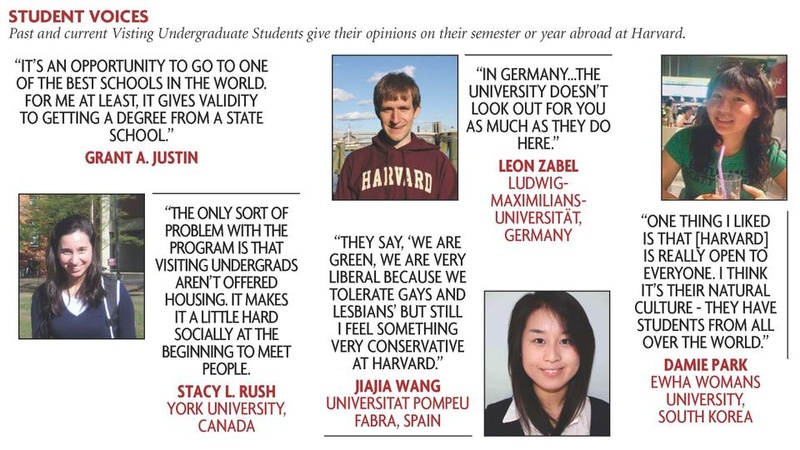Stacy L. Rush had all the makings of a typical Harvard student. She enjoyed taking biology courses and spending time at Harvard Hillel. She had even founded an officially recognized student organization. Yet when she e-mailed Organismic and Evolutionary Biology Lecturer Andrew Berry with a question about her coursework, he was perplexed.
Upon receiving the student’s e-mail, Berry looked her up on Harvard College Facebook and was surprised to find she was unlisted.
“Who are you?” he asked, bewildered, when she walked into class the next day. Laughing, Rush explained that she was a Visiting Undergraduate Student.
Rush and her fellow VUS (pronounced “vuzz” by those in the know) come to Harvard from universities around the world to study for a semester or a year. Though the VUS become involved in most aspects of Harvard life, the existence of this program remains unknown to many at the University and nearly unadvertised outside of Harvard.
GOING ABROAD—TO HARVARD
The Visiting Undergraduate Student Program allows undergraduates from any university in the world to apply to attend Harvard for one or two semesters.
Many of those who participate in this program are international students. Others come from small liberal arts schools in the U.S., and a few come from Harvard’s peer institutions—last year, one visiting student hailed from Princeton and another from Brown.
The students list a variety of reasons for coming to Harvard, but most center on academics. According to Sarah R. Cole, a lecturer on History and Literature who serves as the advising coordinator for the VUS Program, most of the international students major in economics in their home countries and hope to gain an American perspective on the field. The domestic students, she said, tend to be math or science concentrators who feel they have exhausted the course offerings in their subjects at their colleges.
Jiajia Wang, who came from Universitat Pompeu Fabra in Barcelona, Spain to participate in the VUS Program in 2009, said that she was planning to apply to graduate programs in economics in the U.S. and wanted a preview of the American educational system.
Damie Park said she thought that Harvard would offer her more opportunities in her field of study—Women, Gender, and Sexuality—than Ewha Womans University in Korea where she was an undergraduate. Hoping to transfer to Harvard in 2008, she learned that transfer admissions had been suspended—Harvard did not accept any transfer students in 2008 and 2009—but that she could spend a year at Harvard as a VUS.
For Grant A. Justin, the VUS Program offered him “a second chance,” he said. A self-described “terrible student in high school,” he cleaned up his grades while attending the University of Oregon for a year and Montana State University for two years. Adding a year at Harvard to his resume before his final year at MSU, he said, “definitely looks good.”
The application process for visiting students is similar to the regular admissions process, but it differs in several significant ways. First, VUS can enter Harvard in either the fall or spring semesters, so applications are evaluated twice each year.
Rather than focusing on personal characteristics or experiences, the essay portion of the application asks them to “Be as specific as you can regarding your academic interests and the curriculum you expect to follow.”
And though they do have the opportunity to indulge in shopping week once they arrive on campus, prospective VUS must list in their applications the four courses that they might enroll in during their first term at Harvard.
The number of VUS applications and the admissions rate for the program contrast starkly with the Harvard admissions norm. Whereas 614 students applied for transfer admission and over 30,000 sought regular admission in fall 2010, just 47 applied for the VUS Program. Of those applicants, 32 were admitted, and 30 decided to attend—21 are here for just the fall semester, and 9 will stay for the full year.
Read more in News
Salt Intake Remains the Same













